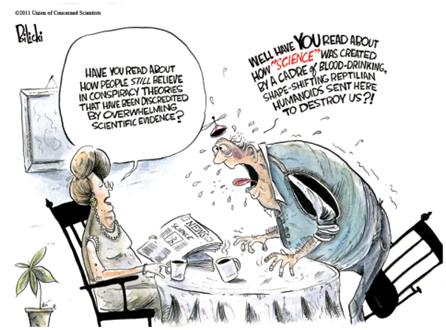2013 SkS Weekly Digest #34
Posted on 25 August 2013 by John Hartz
SkS Highlights
John Cook's Bulletin of the Atomic Scientists: Closing the Consensus Gap generated the most buzz (number of comments) of the articles posted on SkS this past week. It is a summary of Cook's lengthier article, Closing the consensus gap: Public support for climate policy published by the prestigious Bulletin of Atomic Scientists. In both articles, Cook discusses the SkS paper Quantifying the Consensus and why there was a need for it
Toon of the Week

Quote of the Week
Overall, the President's remarks on the environment struck a strong note on climate change and clean energy. “Climate change is real. The planet is getting warmer. And you’ve got several billion Chinese, Indians, Africans and others who also want cars, refrigerators, electricity,” Obama said. “As they go through their development cycle, the planet cannot sustain the same kinds of energy use as we have right now.”
Obama Slams Dirty Energy Money In Congress: ‘Fossil Fuel Industries Tend To Be Very… Influential’ by Annie-Rose Strasser, Climate Progess, Aug 23, 2013
SkS Week in Review
- 2013 SkS Weekly News Roundup #34B by John Hartz
- Fasullo (2013) Seeks Some Levelheadedness Regarding Sea Level Variability by John Fusullo
- 2013 SkS News Bulletin #16: Leaked IPCC Report by John Hartz
- Carbon Economics and the Cost of Inaction by gpwayne
- 2013 SkS Weekly News Roundup #34A by John Hartz
- Coumou & Robinson on Extreme Heat: Choose Your Own Adventure by Dana
- Bulletin of the Atomic Scientists: Closing the Consensus Gap by John Cook
- 2012: One of the 10 Warmest Years on Record by NOAA
SkS Rebuttal Article Added
Gpwayne's Carbon Economics and the Cost of Inaction is a new 'basic' level rebuttal of the myth: "CO2 limits will damage economic growth."
Coming Soon
- A Beginners Guide to Representative Concentration Pathways - Part 1 (gpwayne)
- A Beginners Guide to Representative Concentration Pathways - Part 2 (gpwayne)
- 2013 SkS Weekly News Roundup #35A (John Hartz)
- A Beginners Guide to Representative Concentration Pathways - Part 3 (gpwayne)
- Abraham et al. (2013) on ocean heat content (John Abraham)
- Poloczanska et al 2013 (John Bruno)
- 2013 SkS Weekly News Roundup #35B (John Hartz)
Down the road
- Moncking up the Numbers (Rob Honeycutt)
- Global warming has not stopped (Ari Jokimäki)
- How did Ancient Coral Survive in a High CO2 World? (Rob Painting)
- Why Atmospheric CO2 matters: The Really Big Picture (Chris Colose)
SkS in the News
The Cook et al. (2013) Consensus Project was discussed in a new Environmental Research Letters Perspective, History and future of the scientific consensus on anthropogenic global warming.
The 97% consensus was also discussed in an article at The Conversation.
Colubia Journalism Review listed SkS in its 'required skimming on climate change'.
Global Warming is Real re-posted John Cook's Bulletin of the Atomic Scientists: Closing the Consensus Gap.
Wotts Up With that Blog used the SkS graphic of temperature vs. solar activity in comparing and contrasting early and late 20th century warming periods.
Chris Mooney at Mother Jones referenced Dana's Media Overlooking 90% of Global Warming.
HotWhopper referenced Dana's A Comprehensive Review of the Causes of Global Warming.
Carbon Brief referenced Kevin Trenberth's Global warming is here to stay, whichever way you look at it in discussing that claims of a global warming pause have had no impact on public opinion.
Doug Craig's Blog referenced Chris Colose's Toward Improved Discussions of Methane & Climate.
Think or Swim referenced Dana's A grand solar minimum would barely make a dent in human-caused global warming.
SkS Spotlights
Carbon Brief is a UK blog that reports on the latest developments in climate science and energy policy. It also produce briefings, analysis, and fact checks and publishes daily and weekly email newsletter.
The Carbon Brief is grateful for the funding and support provided by the European Climate Foundation. Carbon Brief's Director, Tom Brookes, is director of the Energy Strategy Centre (ESC) - the communications unit funded by the European Climate Foundation (ECF).































 Arguments
Arguments






























Rob Painting, please clarify, explain: 1997-1998 El Niño the most recent event (exceptional warm year on record) when you write "the positive IPO phase weakened considerably and has been in the negative phase since the year 2000. In other words, La Niña been the dominant pattern of late."
Thanks.
Methane release from the East Siberian Arctic Shelf and the Potential for Abrupt Climate Change
Chris - Not sure what you mean, but I'll have a stab at it.
The 1997/1998 monster El Nino happened at a time when the wind-driven ocean circulation was spinning up - having spun down to a low point at around 1993. This spin up - a strengthening of the transport of warm surface water out of the tropics, and enhanced downward (Ekman) pumping in the subtropical ocean gyres - may have prevented the El Nino from being even more severe.
Well, i was wondering since you write weakend considerably in light of the 1998 El Nino, but guessing otherwise it would have been even more pronounced is kind of dramatic thought. Thanks for your fast reply.